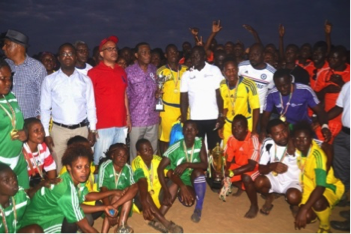
February 2016—In Côte d'Ivoire, soccer is a national obsession—as well as a way to educate youth about avoiding conflict and how to take part in peaceful elections.
During the country’s electoral crisis in 2010, the town of Dabou experienced significant social unrest due to its close proximity to the western suburbs of Abidjan, with violent clashes between youth supporters of ousted president, Laurent Gbagbo, and those of his challenger, Alassane Ouattara. Years after the crisis, many of Dabou’s citizens continue to support hardliners of the former president's party, the Front Populaire Ivoirien, and boycotted the electoral registration process in June 2015.
In anticipation of the October 2015 presidential elections, USAID’s Office of Transition Initiatives partnered with the Union of the Municipal Youth of Dabou (UJCD) to educate and train Dabou youth on the electoral processes during a soccer tournament.
Following the success of the national team in the African Championships earlier in 2015, Cote d’Ivoire was euphoric as local players such as Didier Drogba and Yaya Touré were exalted as heroes worldwide.
UJCD brought together 30 influential youth from Dabou and surrounding villages to be trained by experts on conflict management, mediation, political manipulation, and the role of youth in the electoral process. The training was designed to teach youth how to avoid misinterpretations of the electoral process and reactions to rumors that could lead to violence.
Those trained then relayed the information to their peers and helped choose 210 youth to comprise 14 teams to play in the “vote-ball” soccer tournament.
Vote-ball was an interactive learning method with various components representing the electoral process: The soccer teams represented the presidential candidates; the referees were the Independent Electoral Commission; and team supporters were members of political parties. Local radio helped publicize the innovative event that drew more than 2,000 participants. The final match took place at the end of August.
“The team that scored [sic] most goals wasn’t necessarily the winner because of their foul play! I was glad to see that rules were enforced and respected,” said Cisse Aboubacar, a participant and Dabou resident. “It’s with this same mind that we should consider the upcoming election, so that Dabou can remain in peace.”
One of the team captains, Calixte Angoiba, said that, just as order must be maintained in soccer, “Elections don’t mean war.” Youth “have to apply the same rules to the elections to avoid what happened in Dabou in 2010,” he said.
“I never understood how difficult the role played by the Electoral Commission [CEI] was. I was the referee making decisions in the light of the rules we all agreed on—yet this raised the public’s ire! I can tell you, I have a much better understanding of the challenges the CEI faces now,” said Kouadion Franck, chief referee of the vote-ball games in Dabou.
Since Cote d'Ivoire’s peaceful presidential elections in October 2015, USAID has expanded the vote-ball pilot to other areas to help youth understand the electoral process and become advocates for non-violence.
LINKS







Comment
Make a general inquiry or suggest an improvement.